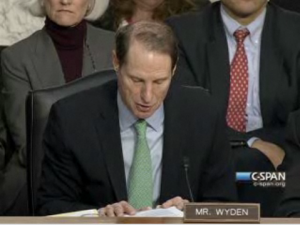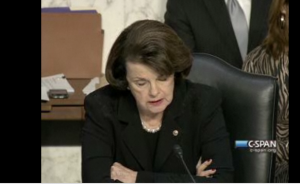If Ron Wyden Hasn’t Seen Awlaki Memo, There Has Been Inadequate Oversight
As MadDog noted and Ellen Nakashima reported, Ron Wyden is getting cranky that DOJ won’t even show him–a member of the Senate Intelligence Committee–the OLC memo authorizing the killing of Anwar al-Awlaki.
There’s one basic thing the letter makes clear (that Nakashima doesn’t emphasize). Ron Wyden, a member of the Senate Intelligence Committee, has still not seen the legal justification for killing Anwar al-Awlaki, four months after Awlaki was killed.
So, as you will remember, I called you in April 2011 and asked you to ensure that the secret Justice Department opinions that apparently outline the official interpretation of this lethal authority were provided to Congress. The Justice Department provided me with some relevant information in May 2011, and I mistakenly believed that this meant that you had agreed to my request. Nine months later, however, the Justice Department still has not fully complied with my original request, and it is increasingly clear that it has no intention of doing so.
Simply put, this situation is unacceptable. For the executive branch to claim that intelligence agencies have the authority to knowingly kill American citizens (subject to publicly unspecified limitations) while at the same time refusing to provide Congress with any and all legal opinions that delineate the executive branch’s understanding of this authority represents an indefensible assertion of executive prerogative, and I expected better from the Obama Administration.
So Wyden asked for the legal justification before Awlaki was killed, at a time when he could have exercised oversight over the killing, and got “some relevant information” but not the legal justification he asked for. And DOJ has not given him the legal justification since.
We know the Gang of Four had some kind of review over the killing, because all four made comments after his death in support. But there should be no justification for keeping such information at the Gang of Four level at this point–Awlaki is good and dead, the covert operation to kill him achieved its objective and is not all that covert now that the guy who oversaw the operation has talked about it on TV.
And yet these are the questions that Wyden still has about the killing:
Some of these questions include: ‘how much evidence does the President need to decide that a particular American is part of a terrorist group?’, ‘does the President have to provide individual Americans with an opportunity to surrender before using lethal force against them?’, ‘is the President’s authority to kill Americans based on authorization from Congress or his own authority as Commander-in-Chief?’, ‘can the President order intelligence agencies to kill an American who is inside the United States?’, and ‘what other limitations or boundaries apply to this authority?’.
If even the members of the Senate Intelligence Committee have not been permitted to review the Administration’s legal justification for the targeted killing of an American citizen, then the oversight over the op is even more inadequate than we knew. The Administration has really been operating on the principle that it can go off and kill American citizens without even having the elected representatives designated to oversee their actions fully review such killings.



